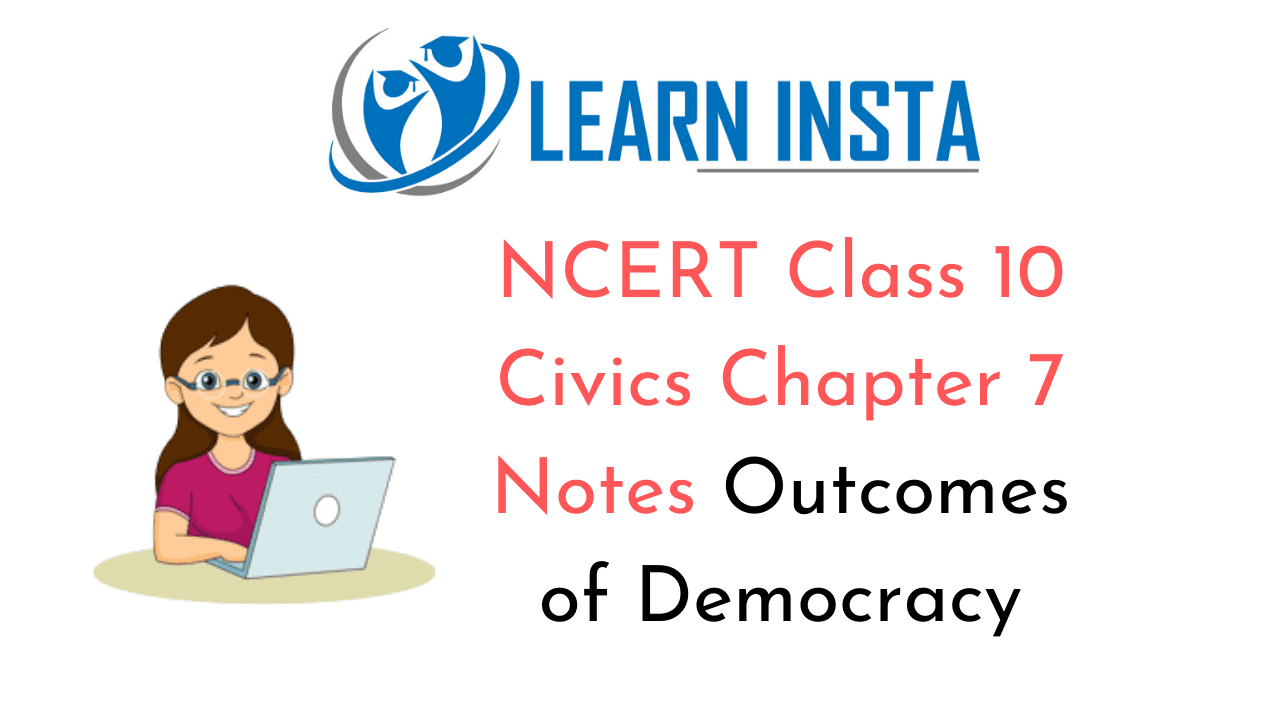 On this page, you will find NCERT Class 10 Civics Chapter 7 Notes Pdf free download. CBSE Class 10 Social Science Notes Civics Chapter 7 SST Outcomes of Democracy will seemingly, help them to revise the important concepts in less time.
On this page, you will find NCERT Class 10 Civics Chapter 7 Notes Pdf free download. CBSE Class 10 Social Science Notes Civics Chapter 7 SST Outcomes of Democracy will seemingly, help them to revise the important concepts in less time.
Outcomes of Democracy Class 10 Notes Social Science Civics Chapter 7
CBSE Class 10 Civics Chapter 7 Notes Understanding the Lesson
1. Democracy is a better form of government when compared with dictatorship or any other alternative. But many of us would not be satisfied with democracy in practice.
2. Still we prefer democracy because of several reasons. Democracy can address all socio-economic and political problems. It produces a government that is accountable to the citizens, and responsive to the needs and expectations of the citizens.
3. Some people think that democracy produces less effective government. They opine that non- democratic governments are efficient in decision making and implementation.
4. Democracy is based on the idea of deliberation and negotiation. So, some delay is bound to take place. Because it follows procedures so its decisions may be both more acceptable to the people and more effective.
5. Democracy ensures that decision-making will be based on norms and procedures. So, a citizen who wants to know if a decision was taken through the correct procedures can find this out. It means there is transparency in democracy.
6. Democracies often frustrate the needs of the people and often ignore the demands of a majority of its population. Still they are better than non-democracies. The reason is that democratic government is legitimate government. It is people’s own government.
7. So far economic growth and development are concerned, democracies haven’t fulfilled these expectations so far. If we consider all democracies and all dictatorships for the fifty years between 1950 and 2000, dictatorships have slightly higher rate of economic growth. The inability of democracy to achieve higher economic development worries us.
8. But we cannot say that democracy is a guarantee of economic development because economic development depends on several factors e. country’s population size, global situation, etc. Hence, it is better to prefer democracy as it has several other positive outcomes.
9. Democracies are based on political equality. All individuals have equal weight in electing representatives. But they do not appear to be very successful in reducing economic inequalities. A small number of ultra-rich enjoy a highly disproportionate share of wealth and incomes whereas a large section of the population suffers due to extreme poverty.
10. Democracies accommodate various social divisions. They have the ability to handle social differences, divisions and conflicts. Non-democratic regimes often suppress internal social differences.
11. Democracy stands much superior to any other form of government in promoting dignity and freedom of the individual. Respect to and equal treatment of women are necessary ingredients of a democratic society. That does not mean that women are actually always treated with respect. But once the principle is recognised, it becomes easier for women to wage a struggle against what is now unacceptable legally.
12. Democracy in India has strengthened the claims of the disadvantaged and discriminated castes for equal status and equal opportunity.
13. The most distinctive feature about democracy is that its examination never gets over. As democracy passes one test, it produces another test. This process never ends.
14. Democracy transforms people from the status of a subject into that of a citizen. It is undoubtedly better than dictatorship and monarchy.
Outcomes of Democracy Class 10 CBSE Notes Important Terms
Prudential: Based on prudence, or on careful calculation of gains and losses.
Outcomes: A result or effect of an action, situation, etc.
Accountable: Required or expected to justify actions or decisions, responsible.
Responsive: Reacting quickly and positively.
Legitimate: Conforming to the law or to rules.
Deliberation: Long and careful consideration or discussion.
Negotiation: Discussion aimed at reaching an agreement.
Dictatorship: Government by a dictator (a ruler with unrestricted authority).